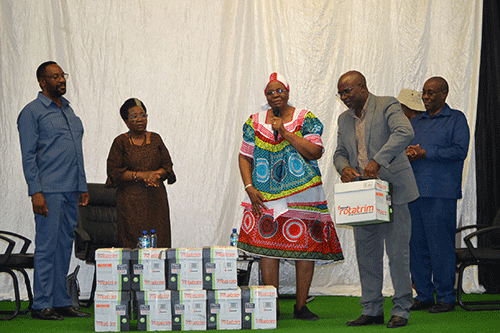KATIMA MULILO – It has emerged that one of the main challenges leading to poor academic performance and lack of school supervision in the Zambezi region is the delay in appointing teachers and principals.
This came to light after various school teachers and principals expressed their concerns and challenges to Deputy Prime Minister Netumbo Nandi-Ndaitwah during a round table discussion with education stakeholders on Sunday.
Sanjo Secondary School principal Betty Silumbu said she offers technical subjects but her school has no advanced subsidiary (AS) Physics teacher.
“We have serious delays of appointments in critical subjects such as Mathematics and Physics. My school has no Physical Science teacher since January. What do you expect at the end of the day? It’s chaos and this affects our education,” Silumbu complained.
The Zambezi education directorate in consultation with the chairperson of the Zambezi Education Forum, Alfred Ilukena, who is a former education permanent secretary agreed to undertake school visits focusing on grade 11-12 schools and where possible grade 10, with a view to motivate the learners as they prepare for their final examinations. The visits covered a total of 19 senior and combined schools with a total of 6 158 learners reached.
On staffing, Ilukena said the main challenge is the delays in appointing teachers. He said interviews are held but appointments take forever to come through.
“In some cases, interviews are held, recommendations made but when appointments are made, such appointments have no relevance to the vacancy at the school and yet schools are told to just accept. Without any supporting evidence, we were told of interviews conducted and recommendations made but inspectors’ tamper with such recommendations in favour of their friends or relatives,” he indicated.
Whatever the reasons may be, Ilukena maintained that delayed appointments of teachers create a desperate situation at some schools.
According to him, the appointment of teachers and principals has always been prioritised in the ministry because of the sensitive nature of teaching and learning. “We got to schools where there are no Mathematics, English, and Physics teachers and kids are facing exams. The whole year, learners have no teachers. It is terrible. There are many vacancies unfilled. Elsewhere in some northern regions, such appointments have been reduced to two weeks for teachers and one month for principals and yet in Zambezi, it can be anything up to two years without a principal or a teacher being appointed,” he charged.
This was echoed by Namibia National Teachers’ Union (Nantu) representative in the region, Harry Bona who confirmed many schools are operating with unqualified teachers.
“There are temporary teachers teaching in fields they have no knowledge of, which leads to poor performance,” he noted.
Equally, the delegation was informed of certain practices where a panel recommends the appointment of a teacher but the inspector will change such recommendations in favour of his or her choice.
Ilukena said this has resulted in schools having teachers who have no subject content as per the school vacancies and yet schools are told to accept these teachers.
“A school needs a Mathematics teacher. The panel recommends but the inspector in consultation with human resources appoints an English teacher. If such practices are indeed happening, it is against the professional and ethical conduct of the public service,” he said.
The team’s observation is that the region has too many acting principals thereby denying such schools critical leadership that can effectively structure and enforce a more conducive teaching and learning environment.
Zambezi education director Josty Kawana clarified that the appointment of teachers is done at the regional office. However, the filling of positions such as cleaners, principals, education officers, and heads of departments is handled by the head office in Windhoek.
“Sometimes the schools take a long time to forward their requests for these positions to be filled. We do respond and act as soon as schools identify the positions that need to be filled,” he responded.
Nandi-Ndaitwah told stakeholders that everyone should become a friend of education and find amicable solutions collectively to challenges facing the sector.
“I am happy we are focusing on education. We are doing analysis because we went through education. Everybody needs a teacher to be who they are. We are trying to find a solution because we are all so disturbed by last year’s grade 11 and AS results. However, that should not make us become enemies of ourselves but need to collectively address the problem. As a nation, we all have a responsibility toward education. If our education fails, then our whole economy fails because we won’t have to formulate policies,” she alluded.
–anakale@nepc.com.na


